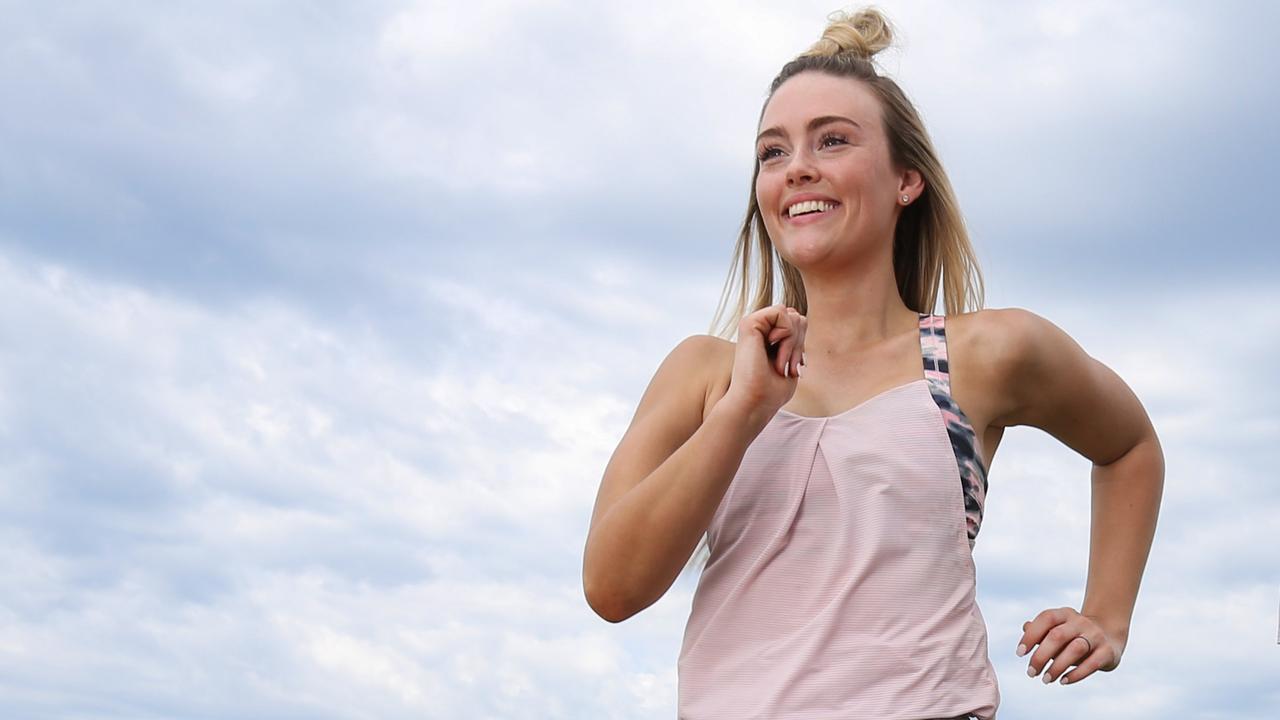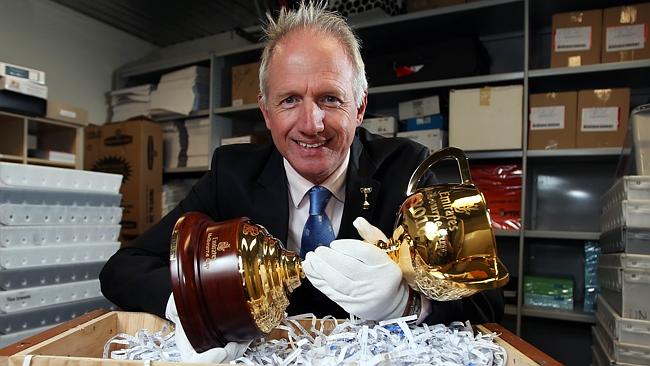Spring Racing Carnival: 20 great Melbourne Cup moments that stopped a nation
From the fashion to the finest horse flesh from around the world, the Melbourne Cup is a race that captivates the nation. Here’s a few moments worth remembering
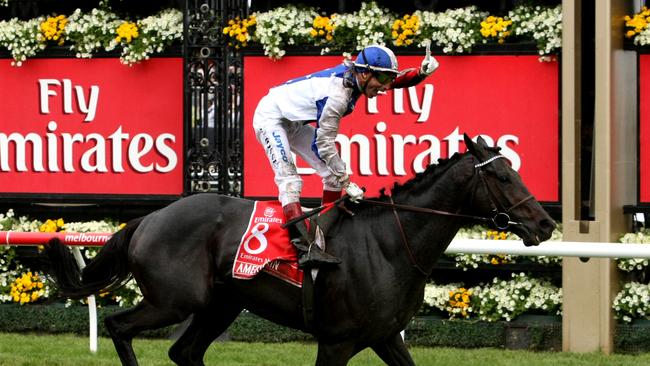
Sponsored Content
Don't miss out on the headlines from Sponsored Content. Followed categories will be added to My News.
THE Melbourne Cup is more than horses and fashion, it’s more than a horse race, bigger than a sporting event. It’s about celebrating who we are as Australians.
Darren Hadland and racing writer Ray Thomas revisit 20 moments that define the race that stops a nation.
“Nowhere in the world have I encountered a festival of people that has such a magnificent appeal to the whole nation. The Cup astonishes me.”
Mark Twain, 1895
HORSE THAT STOPPED A NATION
Phar Lap, 1930
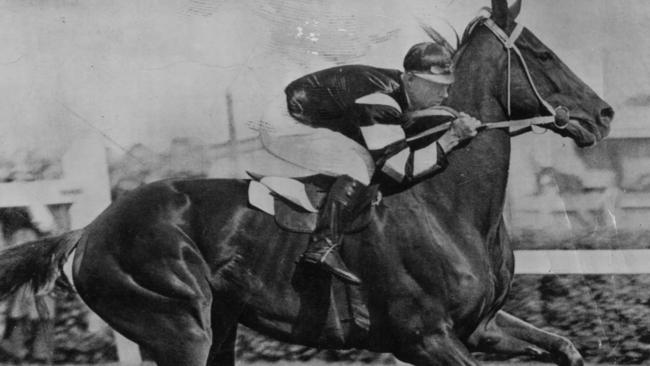
The Red Terror was Bradman of the turf, a beacon of hope through the darkness of the depression. More than any other horse before or since, Phar Lap was the people’s champion.
In 1930, the handicappers couldn’t beat him when they lumped 62.5kg on his back and nor could the gangsters, who fired bullets at him four days before the race.
There have been few more popular or stirring victories than Phar Lap’s, the four-year-old cruising home as an 8-11 favourite — the shortest priced starter in Cup history.
“There’s only one chance they’ve got of beating him,” his jockey Jim Pike once said. “If they can breed them with wings on and get Kingsford-Smith to ride them — and then I doubt whether they’ll beat him.”
LEAVE IT TO DIVA
Makybe Diva, 2005
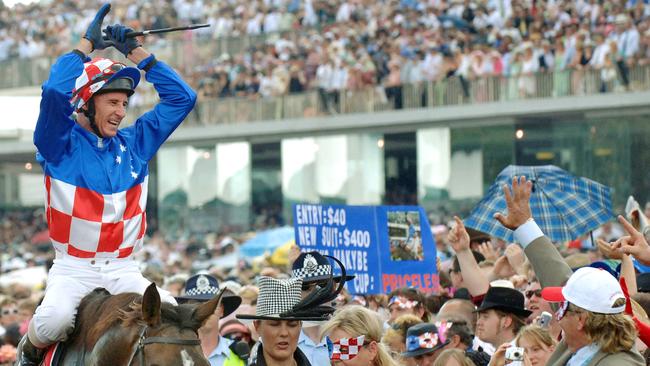
“A champion becomes a legend”. Those five words sum up mighty mare Makybe Diva and her historic Flemington hat-trick.
Trainer Lee Freedman said, “Go and find the smallest child on the racecourse because he might be the only one to see it happen again”.
Flemington was more than a racetrack eight years ago, it was the coronation of the queen of the turf as fans all turned out in the Diva’s colours to celebrate the champ.
“I owe so much to her. She’s just given me the most incredible joy of my professional career. I’m sorry for crying, but this is a moment I’ll take to my grave,” said jockey Glen Boss.
That’s the magic of racing and the Melbourne Cup, it strikes at the heart.
CHEERS IN HEAVEN
Media Puzzle, 2002

It was emotional, heart-wrenching and inspiring as Damien Oliver pointed to the heavens as he crossed the line first on Media Puzzle; a tribute to his brother, Jason, who died in a barrier trial fall a week before in Perth.
The roar was deafening as Media Puzzle pulled away from Vinnie Roe down the straight, with Ollie wearing “J. Oliver” on his silks.
“Mate, Melbourne Cups don’t mean a thing to me anymore. I’d give it back right now to have my brother back. But I know it was the right thing to ride. Jason would have wanted that,” Oliver told the crowd as tears streamed down his face.
Rarely has there been more naked emotion at any sporting event. It’s a tale immortalised in the movie The Cup — a personal triumph over the most tragic of circumstances.
START OF A REVOLUTION
Vintage Crop, 1993
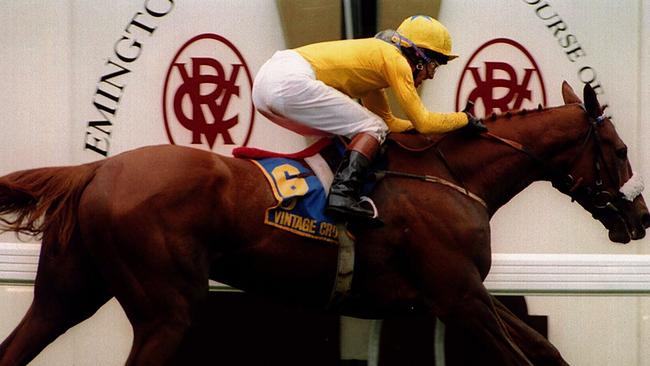
This was the year that Australasia’s great race opened its window to the world, with the first “overseas” winner in 133 years.
The foreign cavalry that comes every year can all thank the success of Irish trainer Dermot Weld, jockey Michael Kinane and Vintage Crop 20 years ago.
“This is probably the furthest anyone has brought a racehorse to win a race, and I’m sure the Melbourne Cup will now develop into the top international two-mile race in the world,” Weld said.
The words proved prophetic with Japanese, French and UK winners of our Cup since.
The 1993 race started with a rendition of Waltzing Matilda and finished with Weld reciting Banjo Paterson’s The Man from Snowy River, but the most iconic of Australian sporting events would never be the same again.
THE HORSE FROM HEAVEN
Saintly, 1996
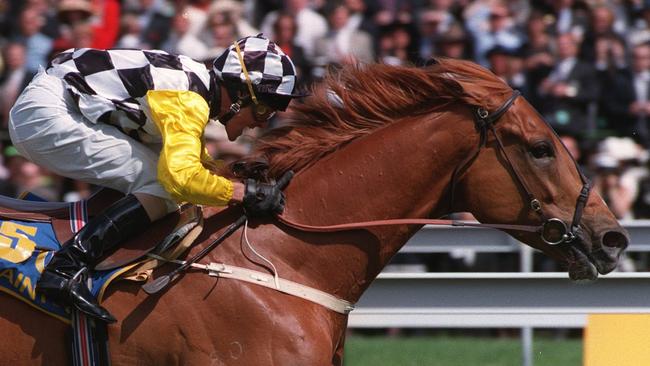
Of his 12 Melbourne Cup winners, you get the impression that Saintly’s success is perhaps the closest to Bart Cummings’ heart.
In 1996, Saintly was virtually invincible as he won the weight-for age championship (the Cox Plate) and handicap championship (Melbourne Cup) in the same spring. He was only the fourth horse to achieve the double.
“I don’t think there’s one race that stands out, but Saintly’s Melbourne Cup was good,” Cummings told The Daily Telegraph in May.
“He is a magnificent horse. I bred him up at Princess Park, we named him, I part-owned him and trained him and we loved him.”
It’s a rare show of affection from the Cups king, who savoured his 10th triumph as Saintly defeated Count Chivas and Skybeau to prove himself the best horse in the land.
FROM LAST TO FIRST
Kiwi, 1983
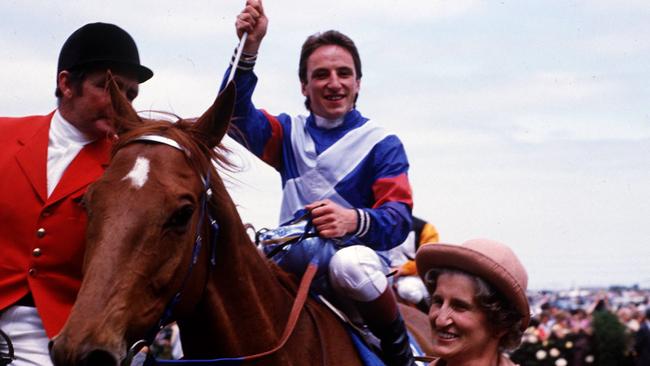
No one who saw it will ever forget how a $1000 horse and his brash 20-year-old jockey Jimmy Cassidy left an indelible mark on the great race.
Kiwi was like a train as he came from last and swept up the entire field in a Bernborough-like finish over the final few hundred metres.
The Kiwi story is still celebrated 30 years on: a horse owner/trainer Snowy Lupton bought to muster stock on his farm in New Zealand before going on to win Australasia’s richest race with the most extraordinary finish.
“A New Zealander winning the Melbourne Cup on a horse called Kiwi. Still the greatest thrill of my life,” Cassidy said years later. “I reckoned back then if I never won another race I would have died happy.”
AMERICAIN EXPRESS
Americain, 2010
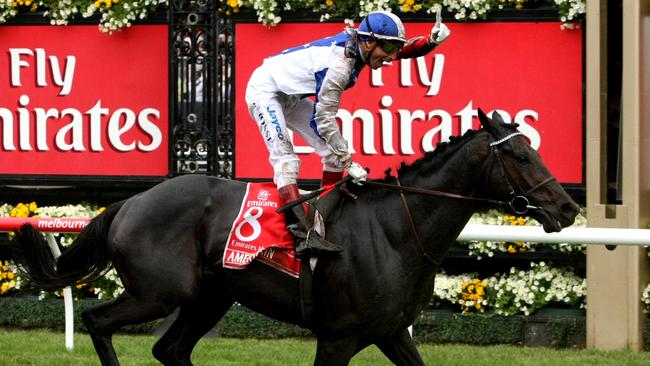
The 150th edition of the Melbourne Cup highlighted how far the race has come, with a French-trained horse taking the honours with a Hong Kong-based jockey on board.
The heartbreak story was Bart Cummings’ superstar and Flemington’s sentimental favourite So You Think not quite lasting the distance to finish third, with Maluckyday second.
Gerald Mosse took his time on board Americain, before timing his run to perfection.
“The job is so easy when we have the best race and the best horse,” Mosse said.
“The favourite was in front of me and I took my time. I pressed the button at the right time and I knew in the last 250 I was going to catch (So You Think).”
“Every Group 1 is a big moment, but with a crowd like that, sometimes my throat is getting a bit tight. It is difficult to explain but the feeling is a bit strong.”
WEIGHT OF HISTORY
Carbine, 1890
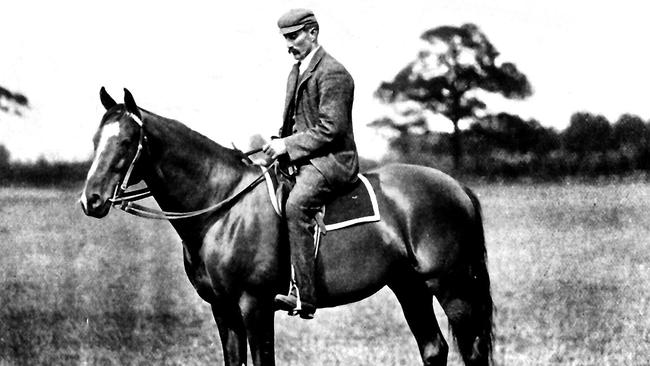
What a champion. The numbers are still mind-boggling. Carbine carried 66kg to win his Melbourne Cup — 24kg more than the second-placed horse Highborn. He defeated 39 other horses, ran a race record 3min 28.25sec and won by three lengths.
Carbine’s weight-carrying record will stand forever, ensuring his success will remain part of turf folklore.
“Probably never has a sporting event of any description in the Australian colonies ever evoked as much interest as this,” reported the Courier-Mail newspaper in Queensland.
“Carbine, the mighty Carbine he may now be truly called, in spite of the crushing weight of 10st 5lb, awarded him by the handicapper.”
Carbine was so good that he only failed to place once in 43 starts and on four occasions the horse known as Old Jack won two races in the same day. Remarkable.
THE KING’S WONDER HORSE
Galilee, 1966
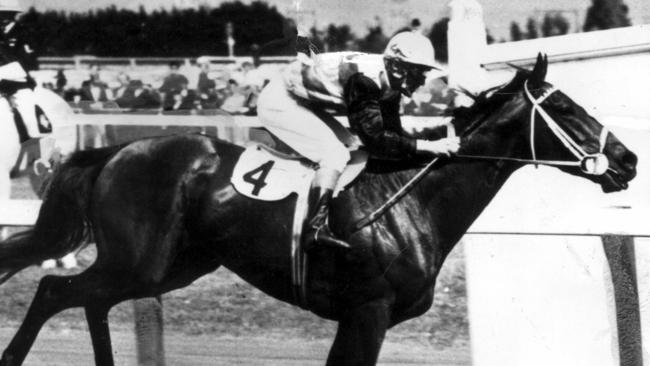
Muhammad Ali is defined by Joe Frazier — and Galilee’s greatness is measured by his mastery of Tobin Bronze, a two-time Cox Plate winner.
Galilee was often rated Bart Cummings’ best horse, at least until Saintly and So You Think came along. In one brilliant spring in 1966, he won the Caulfield Cup, Melbourne Cup, CB Fisher Plate and the Queen’s Plate.
His jockey Johnny Miller once said, “he’s not a bloomin’ horse, he’s an express train”.
Galilee’s finishing burst to beat stablemate and 1965 Cup winner Light Fingers still looks dazzling on old black-and-white footage.
“Galilee, who had the talent to win three Melbourne Cups, won one,” Cummins said in his biography, Bart — My Life.
“You never know what is around the corner. For this reason you have to seize the moment when it comes, and take the opportunity when it arises.”
THE GREATEST WIN OF ALL
Peter Pan, 1934
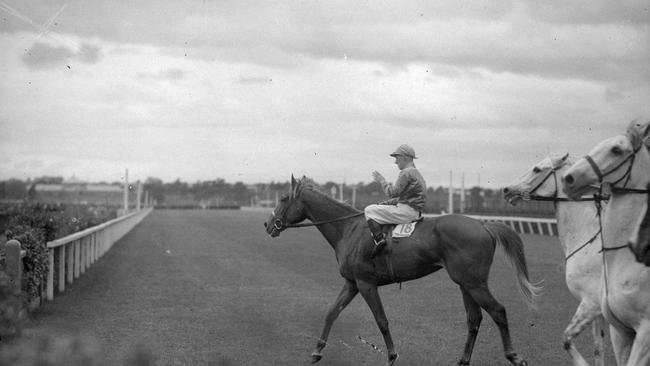
Peter Pan won the 1932 Melbourne Cup when he was almost knocked to the floor by a rival. That win alone was extraordinary.
But it was two years later that he cemented his legacy by carrying 59.5kg to victory on a wet track, defying conditions he didn’t like to pick his way through the field in stunning fashion.
Some call it the greatest win of all the Cups.
“The best performance I have ever seen in all the years I have been in the racing game,” was how jockey Darby Munro described it.
“It was fantastic. He carried 9st 10lb over the two miles and won by three lengths in mud up to his hocks.”
When Peter Pan emerged on the scene, he was instantly compared to Phar Lap and described as a “super horse”.
Trainer Frank McGrath once said, “Peter Pan would have beaten Phar Lap from six furlongs to six miles.” High praise.
MARRIAGE MADE IN HEAVEN
Let’s Elope, 1991
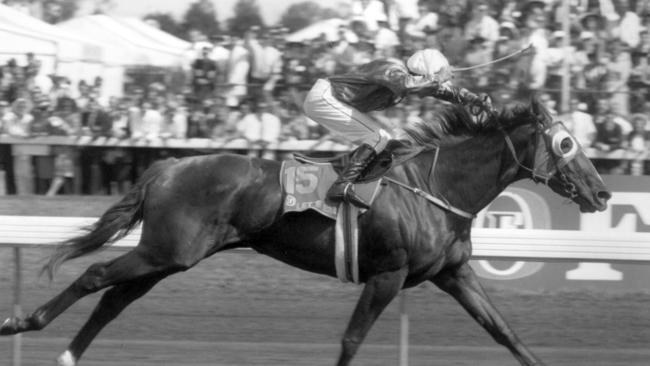
Bart Cummings’ star became the first mare since Rivette in 1939 to complete the Caulfield-Melbourne Cup double, winning hearts along the way.
The master trainer and the burly mare were a perfect match — and she led home another Cummings Cup quinella with Shiva’s Revenge second.
On the track, she was a powerhouse, a force of nature that came into the race perfectly weighted to win at 51kg.
“At the right distance on the right track, she was unbeatable,” Cummings said.
To add to the fairytale, jockey Steven King saluted on his 22nd birthday, making it a double celebration.
THE TRIPLE CROWN
Rising Fast, 1954
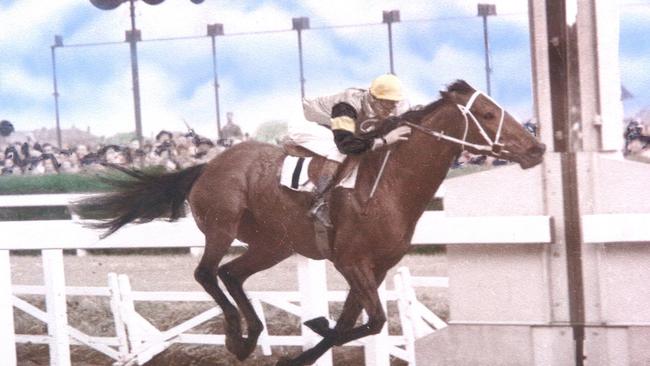
Imagine winning the Caulfield Cup, Cox Plate and Melbourne Cup in three amazing weeks of racing. That’s what Kiwi horse Rising Fast accomplished, ensuring his place in both the Australian and New Zealand Racing Hall of Fames.
He won the 1955 Caulfield Cup and was only beaten by three-quarters of a length in the Melbourne Cup, losing to Toporoa who was carrying 15kg less than.
Toporoa also severely checked the favourite in running, leading the crowd to call for a protest.
In his 1971 book, Racing with Rising Fast, owner Leicester Spring writes: “I had owned and raced a great champion to whom I and my family are everlastingly grateful for all that he has given us ... when I feed him and talk to him on my farm today I am lost for words and stand with my hand on his neck, spellbound in admiration.”
PICTURE PERFECT FINISH
Might and Power, 1997
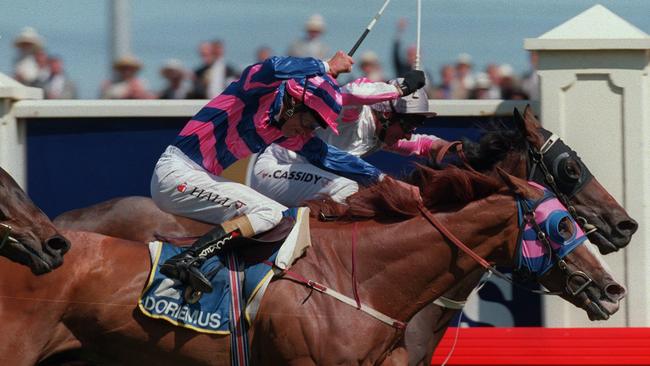
Greg Hall on Doriemus saluted in delight, believing he had run down Might and Power in one of the most thrilling races in the history of the Cup.
But it was Might and Power, with Jimmy Cassidy on board, who took the honours after leading from start to finish in a bewildering performance.
It was a victory which had him rated as the best stayer in the world.
Owner Nick Moraitis called him “the people’s horse” and there’s no doubt he won many fans with his fighting spirit.
But Cassidy paid him the ultimate tribute: “He was just a remarkable athlete. His will to win and determination to fight off other horses ... the vibe and the feel was just something very special, something you don’t get off other horses.”
THE HEADLESS HORSE
Rivette, 1939
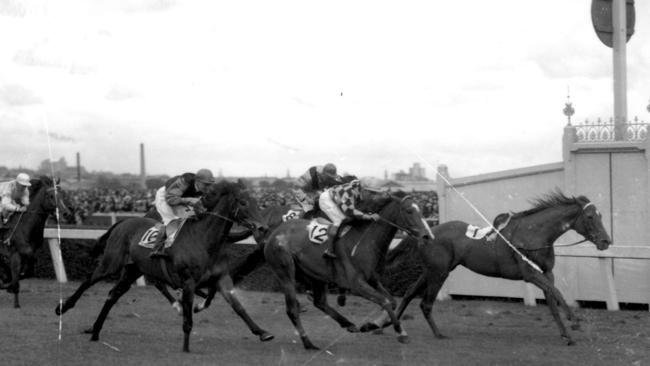
Super mare Rivette was second past the post, but she still completed the Caulfield and Melbourne Cup double in 1939 because Ortelle’s Star lost her rider during the Melbourne Cup but kept racing anyway to “win” the race.
It is the most bizarre finish to a Cup.
“I did not realise that the horse, when it ranged up alongside me half a furlong from the past, was without a rider,” said Rivette’s jockey, Teddy Preston.
“It was not until the horse actually passed me that I saw it did not have a jockey, and I knew I had the race won.”
Ortelle’s Star lost her jockey, Frank de Valle, about 1600m from home when Pantler collided with her.
Rivette was retired after the race.
THE STEVE BRADBURY VICTORY
Delta, 1951
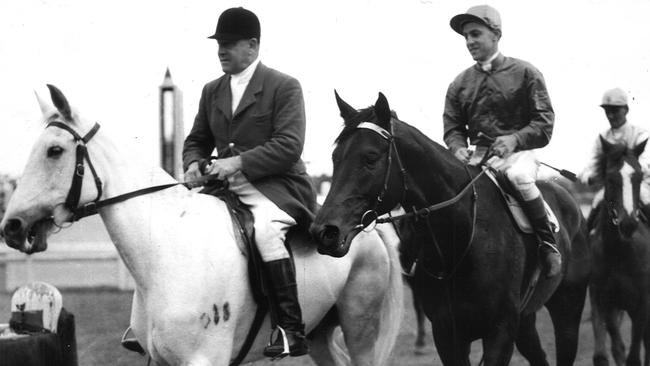
Favourite Morse Code fell at the top of the straight when the race appeared to be at his mercy, allowing Delta to claim a sensational victory.
Somehow all of the other horses avoided the carnage as Morse Code, fourth at the time, came down after clipping Blue Vest just as he was starting his run for home.
Delta, a Sydney stayer, ensured his jeweller owner Adolph Basser won a fortune in bets as he mowed down New Zealand stayer Akbar in the shadows of the post with Neville Sellwood the triumphant rider.
But Morse Code’s jockey Jack Thompson was convinced his horse would have won.
“He was just making a winning run when he clipped Blue Vest’s heels and crashed,” Thompson said.
COALMINER’S HERO
Rain Lover, 1969
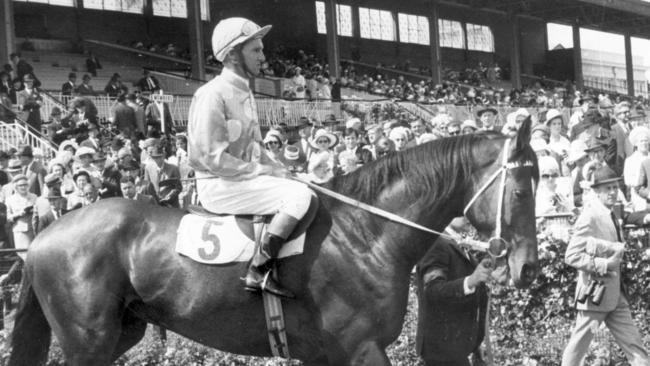
A Broken Hill coalminer named Mick Robins lived the rags-to-riches dream with Rain Lover, who twice won the Cup.
In an interview with the ABC’s 7.30 report, Robins explained the joy of his first win in 1968.
“When you come down to the mounting yard, I couldn’t get down, so I started jumping seats, got my toe caught in the seat and fell arse over head,” Robins said. “I didn’t care if I broke me leg, I was that happy.”
But Rain Lover’s greatest win came a year later when he emulated the legendary Archer by winning successive Cups, edging out Allsop by a neck. Unfortunately, for Robins, he never reached those heights again.
“I had a lot of luck with a good horse and then, over the years, I had a lot of bad luck,” Robins explained on the 7.30 report.
“I think I went six months without winning a race and then my wife got sick (with cancer) and I thought, ‘Well, it’s not all good luck’.
“But that’s life, I suppose — you can’t do much about it.”
START OF THE LEGEND
Light Fingers, 1965
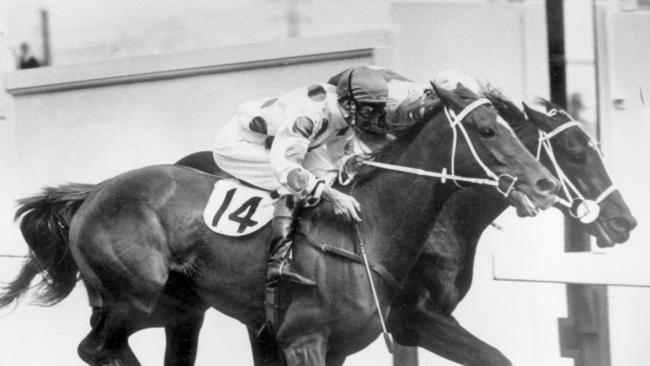
The Bart Cummings story has to start somewhere — and his first Cup triumph came with a brave little mare called Light Fingers.
With Roy Higgins urging her on, Light Fingers found something special to run down stablemate Ziema.
In his book, Bart — My Life, the Cups King takes up the story.
“At the 300m, the only horse coming out to challenge Ziema was Light Fingers …
“Half a furlong out Ziema was still leading Light Fingers by three-quarters of a length. Light Fingers moved up to Ziema’s girth, then his neck …
“And then we all witnessed why Light Fingers was Higgins’ favourite horse. He was flogging her with the whip all the way down the straight and it hurt him more than it hurt her. But as he hit her she went lower and lower with that gorgeous grass-cutting gallop. Four, three, two strides from home, she stuck out her neck as far as it would go ...”
THE EXPRESS LANE
Gurner’s Lane, 1982
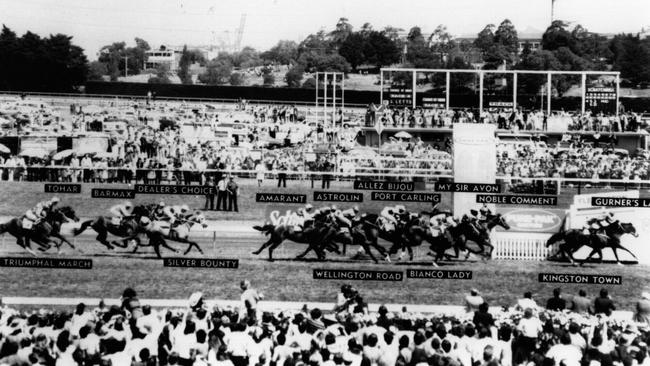
Did Malcolm Johnston go too early on Kingston Town?
It remains one of the hottest debates in the history of the Cup as TJ Smith’s champ and one of this country’s greatest horses failed in his quest for a Melbourne Cup.
Mick Dittman, riding Gurner’s Lane, found a keyhole run down the fence to finish over the top of Kingston Town, who started his run for home 600m from the finish.
“Everything went according to plan, except getting beaten by a neck. In our game, you win by a neck, you’re a superstar. You get beat by a neck, you’re a mug,” Johnston said after the race.
Of course, Dittman produced a classic ride to beat him.
THE IMMORTAL DOZEN
Viewed, 2008
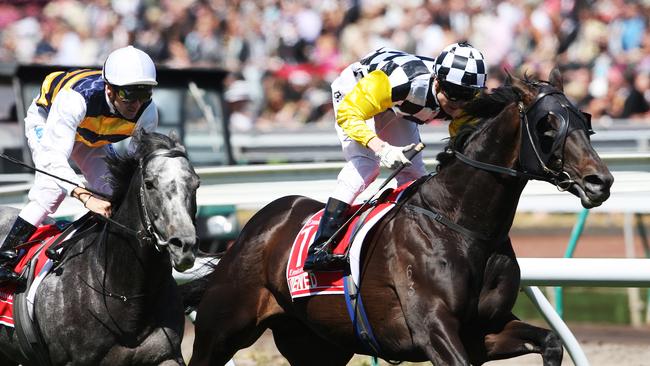
Bart Cummings is a national treasure, the name inextricably linked to the race that stops a nation. His most recent winner was Viewed, who held off Bauer by a nose, and the theatre and emotion made it one of the most memorable days at the track.
Viewed’s win ended a 10-year drought for the then 80-year-old and the normally implacable trainer even appeared to wipe away a tear as he tried to take in the moment.
“Well I suppose it could be (a tear), yeah. These things can create that, but I do get a bit of hay fever you know,” Bart said in one of the great Melbourne Cup lines.
Viewed’s jockey Blake Shinn described Cummings “as a master”.
There’s no doubt that Cummings has had the greatest influence on the great race.
155 YEAR RECORD FINALLY BROKEN
Prince of Penzance, 2015
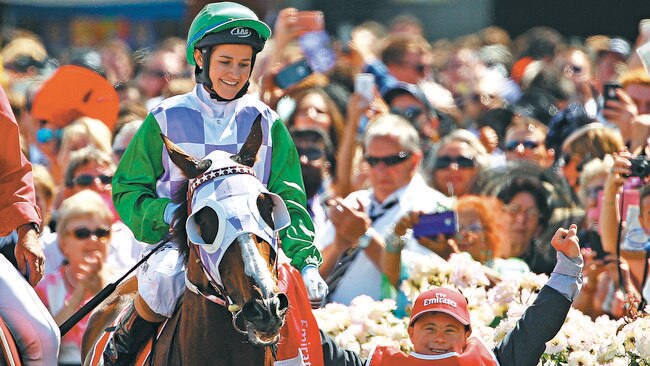
The 2015 Melbourne Cup will forever be etched in our memories as the day Michelle Payne crashed through the glass ceiling of Australian racing when she rode Prince of Penzance to victory, ahead of Max Dynamite and Criterion.
The 30-year-old and her ride were given little attention in the lead up to the race that stops the nation, but Payne steered the horse home to the overwhelming cheers of the massive Flemington crowd.
The winner was a $100-1 outsider and strapped by Payne’s brother, Stevie.
On this historic day, Payne became the first-ever female jockey in its 155 year history, to win the Melbourne Cup.
“Unbelievable, it’s like a dream come true. This horse is awesome,” Payne said moments after her historic win. “I lay in bed last night thinking about it. This is just awesome.”
After describing racing as “such a chauvinistic sport”, Payne delivered a powerful — and empowering — message about women in sport.
“I want to say to everyone else, get stuffed, because they think women aren’t strong enough but we just beat the world.”

